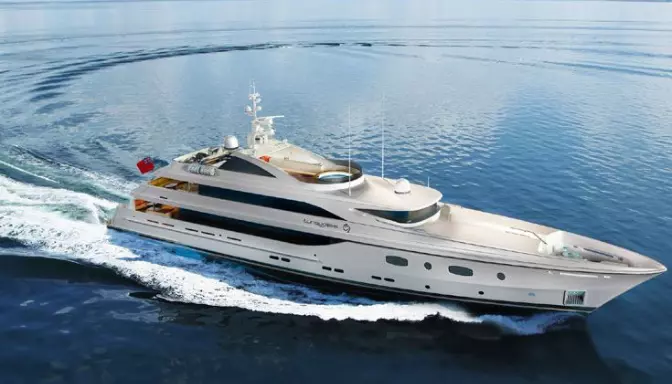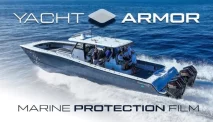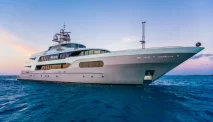Diksia.com - Yachts are more than just boats. They are symbols of status, wealth, and freedom. They are also sources of adventure, relaxation, and fun. Whether you want to sail the world, host lavish parties, or escape the stress of everyday life, owning a yacht can make your dreams come true.
But how do you find the perfect yacht for sale? With so many options, features, and prices, the yacht market can be overwhelming and confusing. That’s why we have created this comprehensive guide to help you navigate the world of yachts and find the one that suits your needs, budget, and lifestyle.
In this article, you will learn:
- The different types of yachts and their pros and cons
- The factors to consider when choosing a yacht
- The best places to search for yachts for sale
- The steps to follow when buying a yacht
- The costs and responsibilities of owning a yacht
- The benefits and joys of yacht ownership
By the end of this article, you will have a clear idea of what kind of yacht you want, where to find it, and how to buy it. You will also be ready to embark on your own yacht journey and experience the wonders of the sea.
Types of Yachts
The first step to finding your dream yacht is to understand the different types of yachts available and their characteristics. Yachts can be classified by various criteria, such as size, design, propulsion, and purpose. Here are some of the most common types of yachts and their advantages and disadvantages:
Motor Yachts
Motor yachts are powered by engines and can reach high speeds and long distances. They are ideal for cruising, exploring, and entertaining. They come in various sizes and styles, from sleek and sporty to spacious and luxurious. They can accommodate from a few to dozens of guests and offer amenities such as cabins, salons, kitchens, bathrooms, and decks. Some motor yachts also have features such as jacuzzis, swimming pools, helipads, and cinemas.
Motor yachts are the most popular and versatile type of yacht, but they also have some drawbacks. They are expensive to buy, maintain, and operate, as they consume a lot of fuel and require regular servicing. They also have a larger environmental impact than other types of yachts, as they emit more noise and pollution.
Sailing Yachts
Sailing yachts are powered by sails and wind, although they usually have auxiliary engines for backup. They are ideal for sailing enthusiasts, adventurers, and nature lovers. They offer a more authentic and romantic way of traveling the sea, as they rely on the skills and knowledge of the crew and the conditions of the weather. They are also more eco-friendly and economical than motor yachts, as they use less fuel and produce less emissions.
Sailing yachts vary in size and design, from classic and elegant to modern and innovative. They can accommodate from a couple to a large group of people and offer amenities such as cabins, salons, kitchens, bathrooms, and cockpits. Some sailing yachts also have features such as water sports equipment, diving gear, and solar panels.
Sailing yachts are the most adventurous and rewarding type of yacht, but they also have some challenges. They are slower and less stable than motor yachts, as they depend on the wind and the waves. They also require more skill and experience to operate and navigate, as they involve more technical and physical aspects.
Explorer Yachts
Explorer yachts are designed for long-range and remote voyages, as they can withstand harsh weather and rough seas. They are ideal for explorers, thrill-seekers, and researchers. They offer a unique opportunity to discover new places, cultures, and wildlife, as they can access areas that are inaccessible to other types of yachts. They are also equipped with advanced technology and safety features, such as radar, satellite, and emergency systems.
Explorer yachts are usually large and robust, with a steel or aluminum hull and a low profile. They can accommodate from a few to many people and offer amenities such as cabins, salons, kitchens, bathrooms, and decks. Some explorer yachts also have features such as tenders, submarines, laboratories, and libraries.
Explorer yachts are the most adventurous and challenging type of yacht, but they also have some limitations. They are expensive to buy, maintain, and operate, as they require a lot of fuel and equipment. They also have a limited aesthetic appeal and comfort, as they prioritize functionality and durability over style and luxury.
Classic Yachts
Classic yachts are yachts that have a historical or cultural significance, as they represent a certain era, style, or tradition. They are ideal for collectors, connoisseurs, and enthusiasts. They offer a rare and valuable experience of sailing history, as they showcase the craftsmanship, design, and heritage of the past. They are also often restored and preserved with great care and attention, as they are considered works of art and pieces of history.
Classic yachts can be either motor or sailing yachts, depending on their origin and configuration. They can range from small and simple to large and lavish, depending on their age and condition. They can accommodate from a few to many people and offer amenities such as cabins, salons, kitchens, bathrooms, and decks. Some classic yachts also have features such as antiques, artworks, and memorabilia.
Classic yachts are the most elegant and prestigious type of yacht, but they also have some challenges. They are difficult to find, buy, and maintain, as they are rare, expensive, and delicate. They also require a lot of knowledge and respect, as they are subject to strict rules and regulations regarding their preservation and use.
Factors to Consider When Choosing a Yacht
Now that you know the different types of yachts and their pros and cons, you need to consider some factors that will help you narrow down your options and find the best yacht for you. Here are some of the most important factors to consider when choosing a yacht:
Budget
Your budget is the most obvious and crucial factor to consider when choosing a yacht, as it will determine what kind of yacht you can afford and what kind of expenses you can expect. The price of a yacht depends on many factors, such as size, type, age, condition, features, and location. Generally, the larger, newer, and more luxurious the yacht, the more expensive it will be.
However, the price of a yacht is not only the initial purchase cost, but also the ongoing costs of owning and operating a yacht. These include:
- Maintenance: This includes the regular servicing, cleaning, and repairing of the yacht and its systems, as well as the periodic refitting, upgrading, and refurbishing of the yacht and its features. Maintenance costs vary depending on the type, size, age, and condition of the yacht, as well as the frequency and quality of the service. Maintenance costs can range from a few thousand to several million dollars per year.
- Operation: This includes the costs of fuel, water, electricity, and other consumables that are required to run the yacht and its systems. Operation costs depend on the type, size, and performance of the yacht, as well as the distance and duration of the voyages. Operation costs can range from a few hundred to several thousand dollars per day.
- Crew: This includes the salaries, benefits, and expenses of the crew members that are hired to operate, maintain, and service the yacht and its guests. Crew costs depend on the number, qualification, and experience of the crew members, as well as the level and standard of the service. Crew costs can range from a few thousand to several hundred thousand dollars per month.
- Berthing: This includes the fees and charges of docking, mooring, or anchoring the yacht at a marina, port, or bay. Berthing costs depend on the size and type of the yacht, as well as the location and availability of the berth. Berthing costs can range from a few hundred to several thousand dollars per night.
- Insurance: This includes the premiums and deductibles of insuring the yacht and its contents against damage, loss, theft, or liability. Insurance costs depend on the value, type, and age of the yacht, as well as the coverage and policy of the insurance. Insurance costs can range from a few thousand to several hundred thousand dollars per year.
- Registration: This includes the fees and taxes of registering the yacht and its ownership under a certain jurisdiction or flag. Registration costs depend on the size, type, and value of the yacht, as well as the jurisdiction and flag of the registration. Registration costs can range from a few hundred to several thousand dollars per year.
As you can see, owning a yacht is not a cheap endeavor, and you need to be prepared and realistic about the costs involved. A good rule of thumb is to allocate at least 10% of the purchase price of the yacht for the annual costs of owning and operating the yacht. For example, if you buy a yacht for $10 million, you should expect to spend at least $1 million per year on the yacht.
Purpose
Your purpose is another important factor to consider when choosing a yacht, as it will determine what kind of yacht you need and what kind of features you want. The purpose of your yacht is the main reason or goal that you have for buying and using a yacht. It can be anything from personal to professional, from recreational to commercial, from practical to emotional. Some of the most common purposes of yachts are:
- Cruising: This is the most common and general purpose of yachts, as it involves traveling the sea for pleasure, leisure, or exploration. Cruising can be done solo, with family, with friends, or with guests, and can range from short trips to long voyages. Cruising requires a yacht that is comfortable, reliable, and versatile, as it needs to adapt to different destinations, conditions, and preferences. Cruising also requires a yacht that has enough space, storage, and amenities to accommodate the crew and the guests, as well as their luggage, equipment, and activities.
- Racing: This is a more specific and competitive purpose of yachts, as it involves participating in sailing competitions or challenges. Racing can be done individually or in teams, and can vary in level, format, and duration. Racing requires a yacht that is fast, agile, and responsive, as it needs to perform well under pressure, speed, and maneuverability. Racing also requires a yacht that has a minimal weight, drag, and resistance, as well as a optimal sail area, shape, and design.
- Chartering: This is a more commercial and profitable purpose of yachts, as it involves renting out the yacht to other people for a fee. Chartering can be done occasionally or regularly, and can target different markets, segments, and niches. Chartering requires a yacht that is attractive, appealing, and marketable, as it needs to attract and satisfy the customers, as well as generate revenue and profit. Chartering also requires a yacht that has a high quality, standard, and reputation, as well as a professional and experienced crew and management.
- Living: This is a more personal and lifestyle purpose of yachts, as it involves using the yacht as a primary or secondary residence. Living can be done permanently or temporarily, and can be motivated by various reasons, such as convenience, privacy, mobility, or adventure. Living requires a yacht that is spacious, cozy, and homely, as it needs to provide the comfort, security, and functionality of a home. Living also requires a yacht that has a low maintenance, operation, and berthing costs, as well as a suitable and convenient location and registration.
As you can see, different purposes of yachts have different implications and expectations for the yacht and its owner. Therefore, you need to be clear and honest about your purpose of buying and using a yacht, as it will help you choose the right yacht for you and avoid disappointment, frustration, or regret.
Size
Your size is another crucial factor to consider when choosing a yacht, as it will determine how much space, comfort, and capacity you will have on board. The size of a yacht is measured by its length, which is usually expressed in feet or meters. The size of a yacht can range from a few meters to over a hundred meters, depending on the type and design of the yacht. Generally, the larger the yacht, the more spacious, comfortable, and luxurious it will be.
However, the size of a yacht is not only a matter of preference, but also a matter of practicality and feasibility. The size of a yacht affects many aspects of owning and operating a yacht, such as:
- Availability: The availability of a yacht depends on how many yachts of that size are on the market and how much demand there is for them. Larger yachts are usually more rare and more sought-after than smaller yachts, which means they are harder to find and more expensive to buy.
- Accessibility: The accessibility of a yacht depends on how easy or difficult it is to access and use the yacht and its facilities. Larger yachts are usually more complex and sophisticated than smaller yachts, which means they require more skill and experience to operate and navigate. Larger yachts also have more restrictions and regulations regarding their docking, mooring, and anchoring, which means they have less options and flexibility for their berthing.
- Affordability: The affordability of a yacht depends on how much it costs to own and operate the yacht and its systems. Larger yachts are usually more costly and resource-intensive than smaller yachts, which means they require more fuel, water, electricity, and other consumables to run. Larger yachts also have more maintenance, operation, crew, berthing, insurance, and registration costs, which means they have more expenses and liabilities.
As you can see, the size of a yacht is not only a benefit, but also a trade-off. Therefore, you need to be realistic and balanced about the size of your yacht, as it will help you choose the right yacht for you and avoid unnecessary or excessive costs and complications.
Style
Your style is another important factor to consider when choosing a yacht, as it will determine how your yacht looks, feels, and functions. The style of a yacht is influenced by its design, layout, features, and decor, which can vary from yacht to yacht, depending on the type, age, and condition of the yacht. Generally, the style of a yacht can be classified into two categories: traditional and modern.
Traditional yachts are yachts that have a classic, elegant, and timeless style, as they follow the principles and conventions of the past. Traditional yachts usually have a wooden or metal hull, a symmetrical and streamlined shape, a simple and functional layout, and a warm and cozy decor. Traditional yachts are ideal for those who appreciate the history, heritage, and craftsmanship of yachting, as well as the charm, character, and nostalgia of the past.
Modern yachts are yachts that have a contemporary, innovative, and futuristic style, as they challenge the norms and expectations of the present. Modern yachts usually have a fiberglass or composite hull, a asymmetrical and angular shape, a complex and versatile layout, and a cool and sleek decor. Modern yachts are ideal for those who appreciate the technology, creativity, and diversity of yachting, as well as the novelty, excitement, and sophistication of the future.
Of course, the style of a yacht is not only a matter of taste, but also a matter of performance and functionality. The style of a yacht affects many aspects of owning and operating a yacht, such as:
- Quality: The quality of a yacht depends on how well the yacht is built, maintained, and serviced, as well as how durable, reliable, and efficient the yacht and its systems are. Traditional yachts are usually more sturdy and solid than modern yachts, as they are made of stronger and heavier materials. However, modern yachts are usually more advanced and refined than traditional yachts, as they are made of lighter and smarter materials.
- Comfort: The comfort of a yacht depends on how spacious, cozy, and luxurious the yacht and its facilities are, as well as how smooth, stable, and quiet the yacht and its systems are. Traditional yachts are usually more spacious and cozy than modern yachts, as they have more room and less clutter. However, modern yachts are usually more luxurious and quiet than traditional yachts, as they have more features and less noise.
- Versatility: The versatility of a yacht depends on how adaptable, flexible, and customizable the yacht and its facilities are, as well as how diverse, varied, and compatible the yacht and its systems are. Traditional yachts are usually more adaptable and flexible than modern yachts, as they have less complexity and more simplicity. However, modern yachts are usually more customizable and compatible than traditional yachts, as they have more options and more integration.
As you can see, the style of a yacht is not only a preference, but also a compromise. Therefore, you need to be aware and selective about the style of your yacht, as it will help you choose the right yacht for you and avoid dissatisfaction, incompatibility, or obsolescence.
Best Places to Search for Yachts for Sale
Once you have decided on the budget, purpose, size, and style of your yacht, you need to know where to look for yachts for sale. There are many places where you can find yachts for sale, both online and offline, but not all of them are reliable, reputable, and convenient. Here are some of the best places to search for yachts for sale:
Yacht Brokers
Yacht brokers are professionals who specialize in buying and selling yachts. They have access to a large and diverse inventory of yachts for sale, as well as a network of contacts and connections in the yachting industry. They can help you find, inspect, negotiate, and purchase the yacht of your choice, as well as provide you with advice, guidance, and assistance throughout the process. They can also help you with the legal, financial, and administrative aspects of the transaction, such as contracts, surveys, taxes, and registration.
Yacht brokers are the most convenient and reliable place to search for yachts for sale, as they offer a one-stop service that saves you time, money, and hassle. However, yacht brokers are also the most expensive and competitive place to search for yachts for sale, as they charge a commission fee that ranges from 5% to 10% of the purchase price, and they may have conflicts of interest or biases that affect their recommendations.
Yacht Magazines
Yacht magazines are publications that feature news, reviews, and articles about yachts and yachting. They have a section that showcases yachts for sale, either by brokers, dealers, or owners. They can help you discover, compare, and evaluate the yachts of your interest, as well as provide you with information, insights, and tips about yachting. They can also help you with the trends, developments, and opportunities in the yachting market, such as new models, launches, and events.
Yacht magazines are the most informative and interesting place to search for yachts for sale, as they offer a comprehensive and engaging source of knowledge and inspiration. However, yacht magazines are also the most outdated and limited place to search for yachts for sale, as they have a lag time between the publication and the distribution, and they have a finite space and scope for the listings.
Yacht Websites
Yacht websites are online platforms that feature information, images, and videos about yachts and yachting. They have a section that lists yachts for sale, either by brokers, dealers, or owners. They can help you browse, filter, and sort the yachts of your interest, as well as provide you with details, specifications, and features about the yachts. They can also help you with the contact, communication, and inquiry with the sellers, as well as the feedback, ratings, and reviews from the buyers.
Yacht websites are the most accessible and diverse place to search for yachts for sale, as they offer a convenient and extensive access to the yachting market. However, yacht websites are also the most unreliable and inconsistent place to search for yachts for sale, as they may have inaccurate, outdated, or fraudulent information, images, or videos, and they may have no quality control or verification of the sellers or the yachts.
Steps to Follow When Buying a Yacht
After you have found the yacht of your choice, you need to know how to buy it. Buying a yacht is not a simple or straightforward process, as it involves many steps, stages, and parties. Here are some of the main steps to follow when buying a yacht:
Negotiation
Negotiation is the step where you and the seller agree on the terms and conditions of the sale, such as the price, payment, delivery, and warranty. Negotiation can be done directly or through a broker, and it can be done verbally or in writing. Negotiation is a crucial step, as it determines the value and quality of the deal, as well as the satisfaction and trust of both parties.
Negotiation can be challenging and stressful, as it involves bargaining, compromising, and persuading. Therefore, you need to be prepared and confident when negotiating, as well as respectful and courteous. You also need to be realistic and flexible, as well as firm and fair. You can use various strategies and tactics to negotiate, such as research, comparison, leverage, and concession.
Survey
Survey is the step where you and the seller inspect and evaluate the condition and performance of the yacht and its systems. Survey can be done by yourself or by a professional surveyor, and it can be done on land or on water. Survey is an essential step, as it verifies the accuracy and validity of the information, images, and videos provided by the seller, as well as identifies any defects, damages, or issues that may affect the value and quality of the yacht.
Survey can be costly and time-consuming, as it involves testing, measuring, and checking. Therefore, you need to be thorough and diligent when surveying, as well as objective and critical. You also need to be cautious and alert, as well as curious and inquisitive. You can use various tools and methods to survey, such as visual, auditory, tactile, and instrumental.
Contract
Contract is the step where you and the seller sign a legal document that formalizes and finalizes the sale. Contract can be drafted by yourself or by a lawyer, and it can be based on a standard or a custom template. Contract is a vital step, as it protects the rights and obligations of both parties, as well as defines the scope and details of the sale, such as the parties, the yacht, the price, the payment, the delivery, the warranty, and the contingencies.
Contract can be complex and confusing, as it involves legal, financial, and technical terms and clauses. Therefore, you need to be careful and clear when contracting, as well as informed and educated. You also need to be honest and transparent, as well as consistent and coherent. You can use various sources and references to contract, such as laws, regulations, and precedents.
Payment
Payment is the step where you and the seller transfer and receive the money for the sale. Payment can be done by cash, check, wire, or escrow, and it can be done in full or in installments. Payment is a final step, as it completes and confirms the sale, as well as transfers the ownership and possession of the yacht from the seller to you.
Payment can be risky and sensitive, as it involves large amounts of money and personal information. Therefore, you need to be secure and safe when paying, as well as verified and validated. You also need to be timely and prompt, as well as accurate and precise. You can use various services and systems to pay, such as banks, agents, and platforms.
Costs and Responsibilities of Owning a Yacht
Buying a yacht is not the end of the journey, but the beginning. Owning a yacht is not only a privilege, but also a responsibility. Owning a yacht involves many costs and responsibilities that you need to be aware of and prepared for. Here are some of the main costs and responsibilities of owning a yacht:
Maintenance
Maintenance is the cost and responsibility of keeping the yacht and its systems in good working order and condition. Maintenance involves regular servicing, cleaning, and repairing of the yacht and its systems, as well as periodic refitting, upgrading, and refurbishing of the yacht and its features. Maintenance is necessary to ensure the safety, performance, and appearance of the yacht, as well as to prevent or fix any problems or malfunctions that may occur.
Maintenance can be done by yourself or by a professional service provider, and it can be done on land or on water. Maintenance can be scheduled or unscheduled, and it can be preventive or corrective. Maintenance can be costly and time-consuming, as it requires a lot of labor, materials, and equipment. Therefore, you need to plan and budget for maintenance, as well as monitor and record maintenance.
Operation
Operation is the cost and responsibility of running the yacht and its systems. Operation involves the consumption of fuel, water, electricity, and other consumables that are required to power and operate the yacht and its systems. Operation also involves the management of the crew, guests, and activities that are involved in using the yacht and its facilities. Operation is essential to enjoy the benefits and features of the yacht, as well as to fulfill the purpose and goal of owning the yacht.
Operation can be done by yourself or by a professional crew, and it can be done on land or on water. Operation can be active or passive, and it can be personal or commercial. Operation can be expensive and resource-intensive, as it requires a lot of energy, water, and other supplies. Therefore, you need to optimize and economize operation, as well as measure and control operation.
Berthing
Berthing is the cost and responsibility of storing the yacht when it is not in use. Berthing involves docking, mooring, or anchoring the yacht at a marina, port, or bay. Berthing also involves the security, protection, and supervision of the yacht and its contents when it is not in use. Berthing is important to ensure the safety, preservation, and accessibility of the yacht, as well as to comply with the rules and regulations of the location and jurisdiction of the yacht.
Berthing can be done by yourself or by a professional service provider, and it can be done on land or on water. Berthing can be permanent or temporary, and it can be public or private. Berthing can be costly and restrictive, as it requires a lot of fees, charges, and taxes. Therefore, you need to research and compare berthing, as well as book and reserve berthing.
Insurance
Insurance is the cost and responsibility of covering the yacht and its contents against damage, loss, theft, or liability. Insurance involves paying premiums and deductibles to an insurance company that provides coverage and compensation for the yacht and its contents in case of an accident, incident, or claim. Insurance also involves complying with the terms and conditions of the insurance policy and reporting any events or changes that may affect the insurance. Insurance is advisable to protect the value and quality of the yacht, as well as to mitigate the risks and costs of owning the yacht.
Insurance can be done by yourself or by a professional insurance agent, and it can be done online or offline. Insurance can be comprehensive or partial, and it can be mandatory or optional. Insurance can be costly and complicated, as it requires a lot of premiums, deductibles, and paperwork. Therefore, you need to review and understand insurance, as well as update and renew insurance.
Registration
Registration is the cost and responsibility of registering the yacht and its ownership under a certain jurisdiction or flag. Registration involves paying fees and taxes to a government or authority that grants and recognizes the ownership and possession of the yacht. Registration also involves complying with the laws and regulations of the jurisdiction or flag that governs and controls the yacht and its use. Registration is mandatory to legalize and legitimize the yacht, as well as to enable and facilitate the use of the yacht.
Registration can be done by yourself or by a professional registration agent, and it can be done online or offline. Registration can be national or international, and it can be beneficial or detrimental. Registration can be costly and burdensome, as it requires a lot of fees, taxes, and documentation. Therefore, you need to choose and change registration, as well as validate and verify registration.
Benefits and Joys of Owning a Yacht
Owning a yacht is not only a cost and responsibility, but also a benefit and joy. Owning a yacht involves many benefits and joys that you can enjoy and appreciate. Here are some of the main benefits and joys of owning a yacht:
Freedom
Freedom is the benefit and joy of having the ability and opportunity to go where you want, when you want, and how you want. With a yacht, you can explore the world, discover new places, and experience different cultures and lifestyles. You can also escape the stress, noise, and crowds of the land, and enjoy the peace, beauty, and serenity of the sea. You can also choose your own route, schedule, and pace, and have the flexibility and control over your travel plans.
Adventure
Adventure is the benefit and joy of having the thrill and excitement of facing the challenges and opportunities of the sea. With a yacht, you can experience the wonders and mysteries of the marine world, such as the wildlife, the landscapes, and the phenomena. You can also engage in various activities and sports, such as fishing, diving, surfing, and sailing. You can also test your skills and knowledge, and learn new things and grow as a person.
Luxury
Luxury is the benefit and joy of having the comfort and convenience of living and traveling in style and elegance. With a yacht, you can enjoy the amenities and features of a home, a hotel, and a resort, all in one. You can also indulge in the services and hospitality of a professional and experienced crew, who will cater to your needs and preferences. You can also impress and entertain your family, friends, and guests, and create memorable and enjoyable moments with them.
Status
Status is the benefit and joy of having the recognition and respect of being a successful and accomplished person. With a yacht, you can express your personality, taste, and values, and showcase your achievements and assets. You can also join and belong to a prestigious and exclusive community of yacht owners, who share your passion and vision. You can also influence and inspire others, and make a positive and lasting impact on the world.
Happiness
Happiness is the ultimate benefit and joy of owning a yacht, as it is the result and reward of fulfilling your dreams and desires. With a yacht, you can achieve your goals and aspirations, and live your life to the fullest. You can also satisfy your needs and wants, and enjoy your life to the highest. You can also share your happiness and gratitude with others, and spread your joy and generosity to the world.
Thank you for reading this article. I hope you found it helpful and informative. If you have any questions, comments, or feedback, please feel free to share them with me. I would love to hear from you and learn from you.






